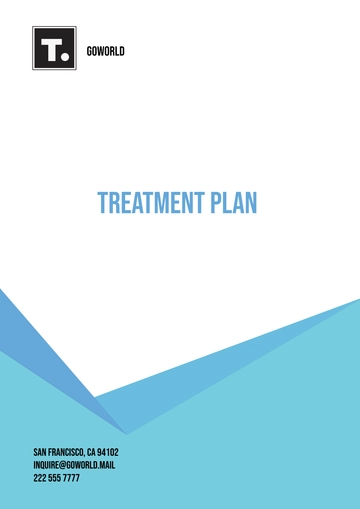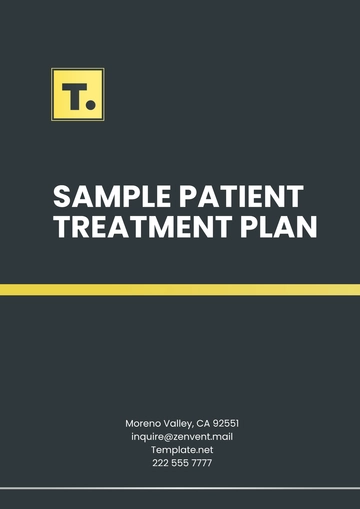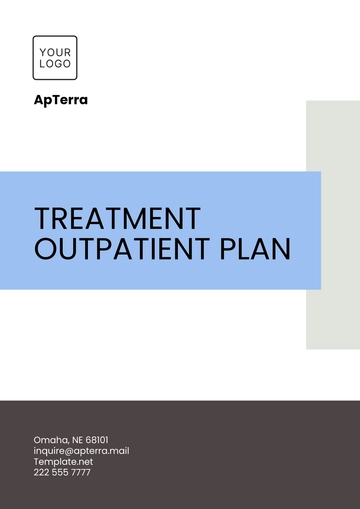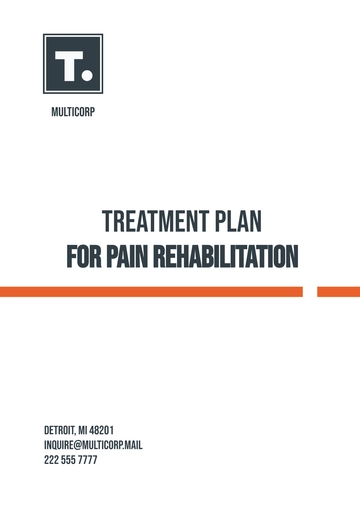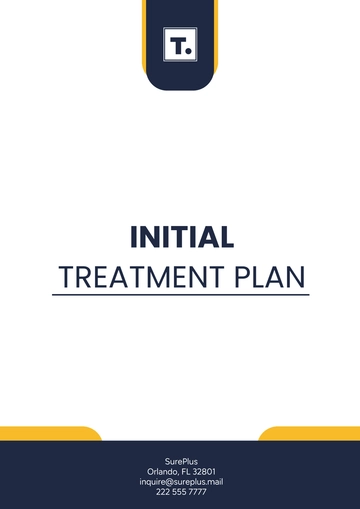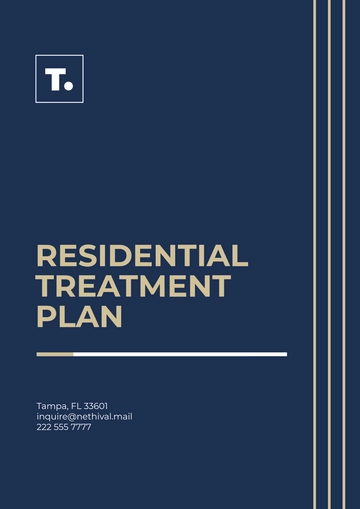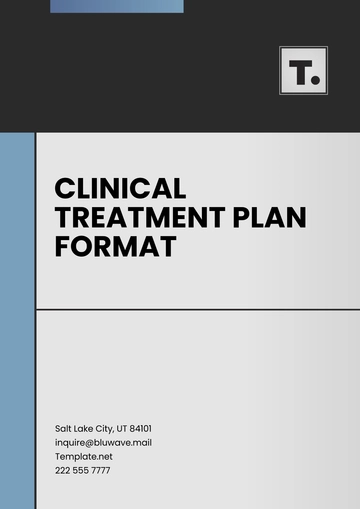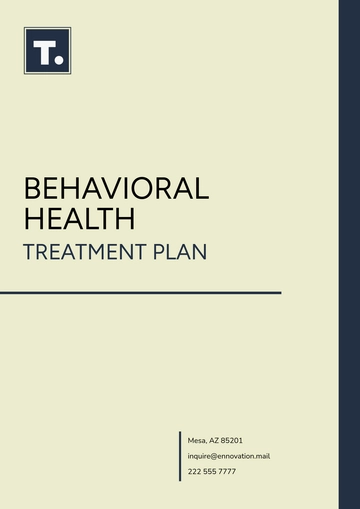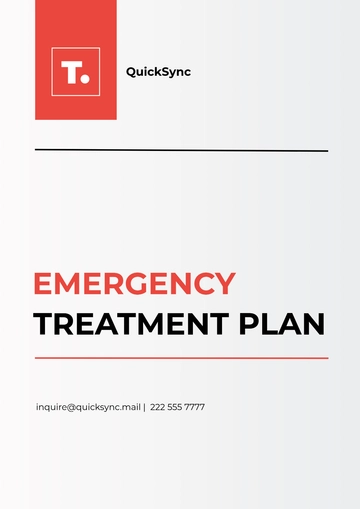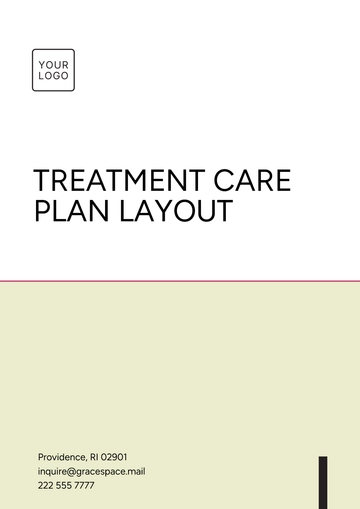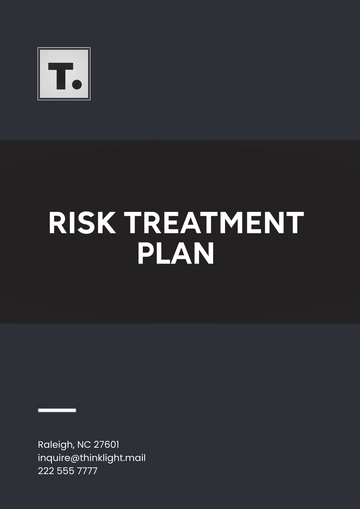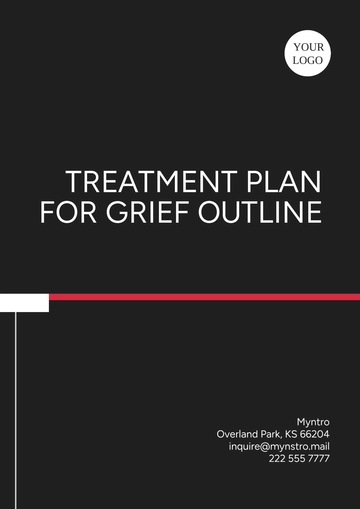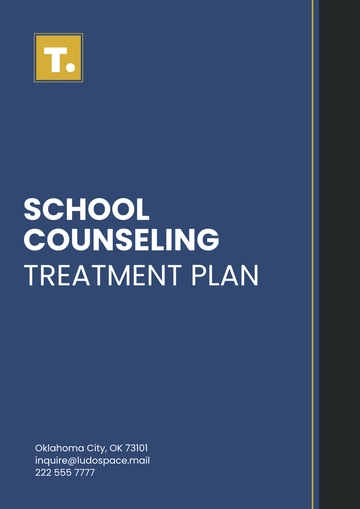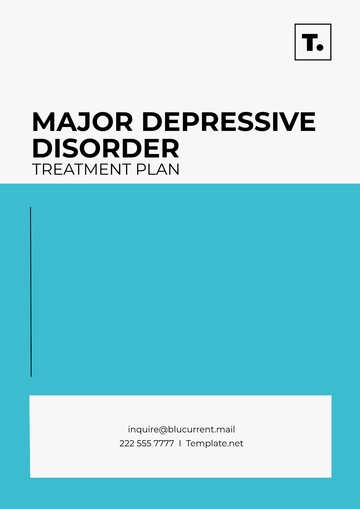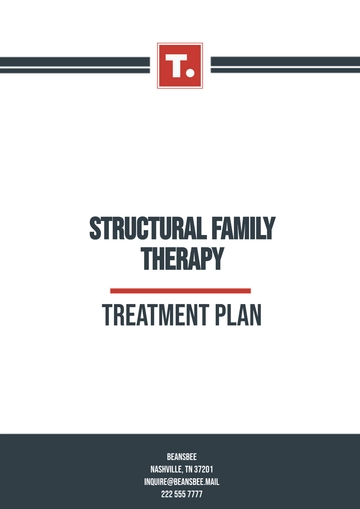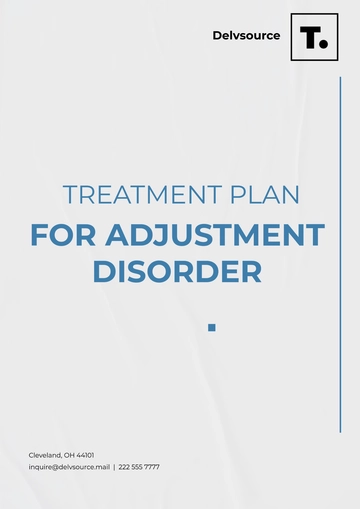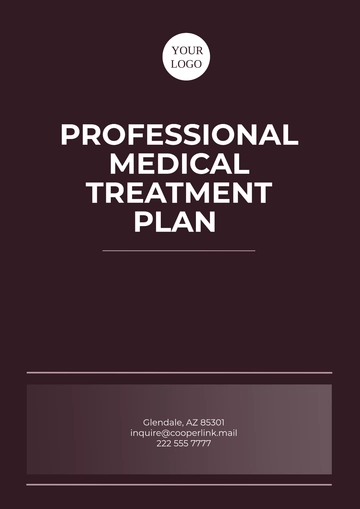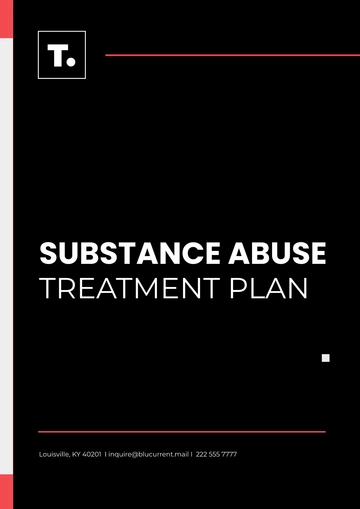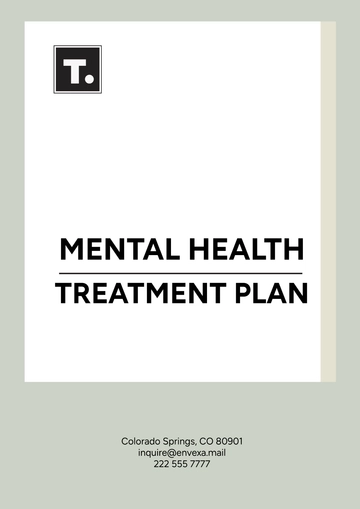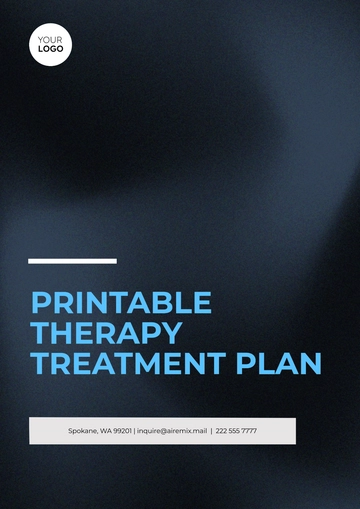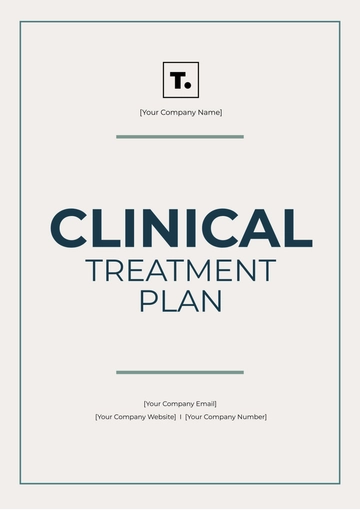Free Treatment Outpatient Plan
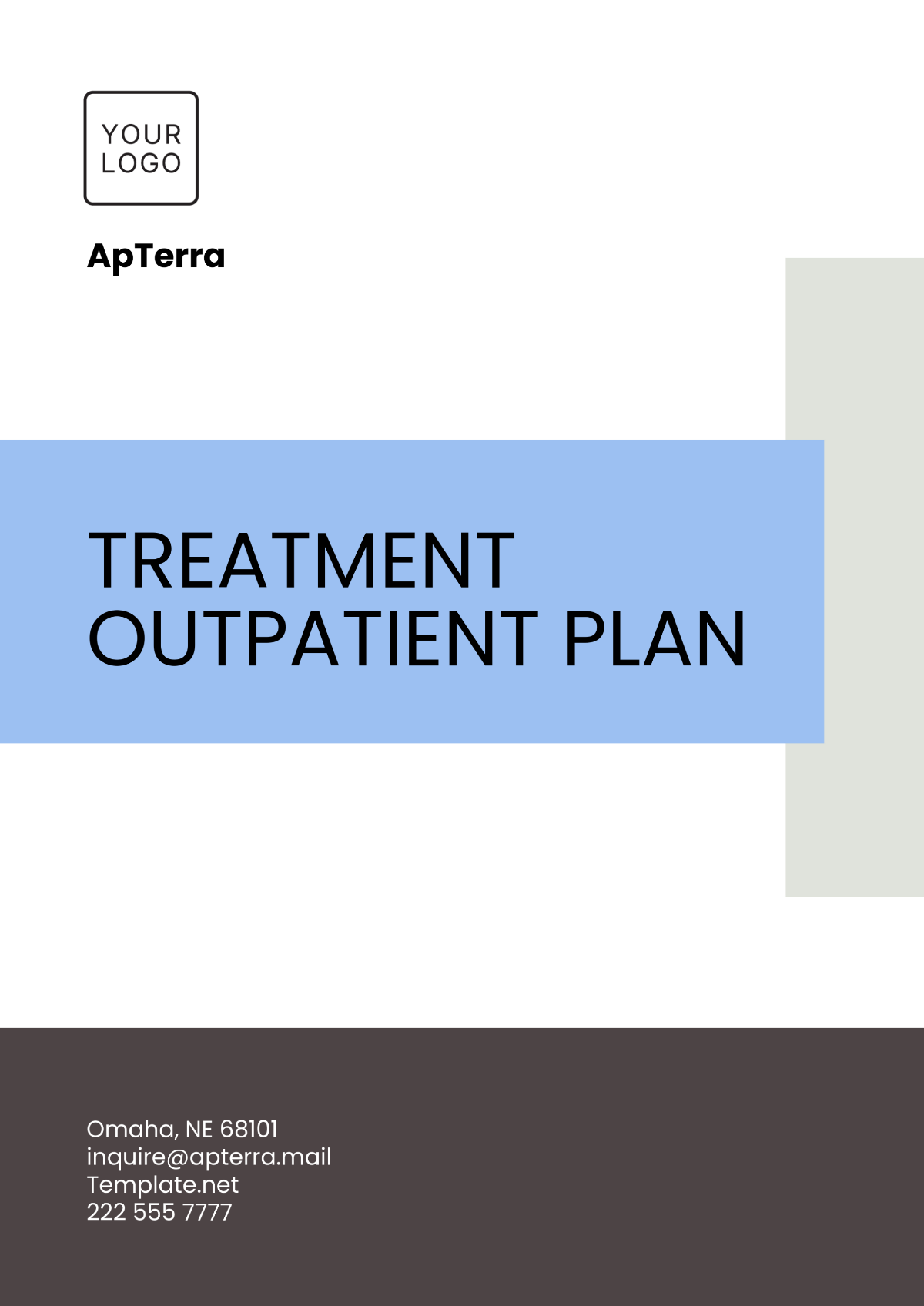
Prepared by: [Your Name]
I. Background
Post-Traumatic Stress Disorder (PTSD) is a mental health condition that can develop in individuals who have experienced or witnessed a traumatic event. Traumatic events may include but are not limited to, natural disasters, combat exposure, physical or sexual assault, accidents, or sudden loss of a loved one. Symptoms of PTSD can manifest in various ways, including intrusive thoughts or memories of the traumatic event and avoidance of reminders of the trauma.
PTSD can significantly impair an individual's functioning in daily life, affecting their relationships, work, and overall well-being. However, with appropriate treatment and support, many individuals with PTSD can experience significant improvements in symptoms and quality of life.
II. Treatment Goals
Reduce symptoms of PTSD, including intrusive thoughts, avoidance behaviors, hypervigilance, and emotional reactivity.
Improve coping skills for managing trauma-related triggers and distressing emotions.
Foster a sense of safety and empowerment in processing traumatic memories.
Enhance overall functioning and quality of life by addressing PTSD-related impairments in relationships, work, and daily activities.
III. Treatment Interventions
Intervention | Description |
|---|---|
Trauma-Focused Therapy | Utilize evidence-based therapies such as Prolonged Exposure Therapy (PE) or Cognitive Processing Therapy (CPT) to address traumatic memories and associated symptoms. Guide the client through systematic exposure to trauma-related triggers and processing of distressing memories to reduce avoidance and increase emotional processing. |
Skills-Based Interventions | Teach coping skills for emotion regulation, distress tolerance, and grounding techniques to manage symptoms of anxiety and arousal. Incorporate mindfulness-based interventions to increase present-moment awareness and reduce reactivity to trauma-related stimuli. |
Psychoeducation | Provide information about the nature of PTSD, common symptoms, and the neurobiological basis of trauma reactions. Educate the client about the principles of trauma recovery and the rationale behind treatment interventions to enhance motivation and engagement. |
Medication Management | Collaborate with a psychiatrist to assess the appropriateness of pharmacotherapy, such as selective serotonin reuptake inhibitors (SSRIs) or other medications, for symptom management. Monitor medication response and side effects closely, adjusting dosage or medication as needed in consultation with the psychiatrist |
IV. Progress Monitoring
Progress monitoring is an integral component of PTSD treatment, allowing for ongoing assessment of symptom severity and treatment response. Clinicians will regularly evaluate the client's progress using validated measures such as the Clinician-Administered PTSD Scale (CAPS) or self-report questionnaires to track changes in symptomatology over time.
Treatment goals and objectives will be reviewed collaboratively with the client to ensure alignment with their recovery trajectory. Any emergent safety concerns or adverse treatment reactions will be closely monitored, with interventions implemented promptly to address the client's well-being. By regularly assessing progress and adjusting treatment strategies as needed, clinicians aim to optimize outcomes and promote the client's overall recovery.
V. Crisis Intervention
In cases where the client experiences acute distress or symptom exacerbation, crisis intervention strategies will be employed to ensure immediate support and intervention. A crisis plan will be developed collaboratively with the client, outlining specific steps to take in the event of a crisis or emergency. This plan will include contact information for crisis hotlines, mental health professionals, or emergency services, as well as personalized coping strategies to manage distress.
Regular review and updating of the crisis plan will be conducted to ensure its relevance and effectiveness in addressing the client's needs. By implementing proactive crisis intervention measures, clinicians aim to minimize the impact of potential crises and promote the client's safety and well-being.
VI. Education and Support for Family Members
Family members play a crucial role in supporting the recovery of individuals with PTSD. Therefore, psychoeducation and support will be offered to family members or significant others to help them understand the nature of PTSD, including common symptoms, triggers, and the recovery process.
Family members will be provided with guidance on how to support the client's treatment goals and create a supportive environment for healing. This may include strategies for effective communication, setting boundaries, and responding to distressing symptoms.
- 100% Customizable, free editor
- Access 1 Million+ Templates, photo’s & graphics
- Download or share as a template
- Click and replace photos, graphics, text, backgrounds
- Resize, crop, AI write & more
- Access advanced editor
Optimize outpatient care with the Treatment Outpatient Plan Template offered by Template.net. This customizable and downloadable template is designed for effective planning and management of outpatient treatments. Editable in our AI Editor Tool, it provides the flexibility to tailor plans to each patient's needs. Print your personalized treatment plans to ensure organized, high-quality outpatient care, leading to better patient outcomes.
You may also like
- Finance Plan
- Construction Plan
- Sales Plan
- Development Plan
- Career Plan
- Budget Plan
- HR Plan
- Education Plan
- Transition Plan
- Work Plan
- Training Plan
- Communication Plan
- Operation Plan
- Health And Safety Plan
- Strategy Plan
- Professional Development Plan
- Advertising Plan
- Risk Management Plan
- Restaurant Plan
- School Plan
- Nursing Home Patient Care Plan
- Nursing Care Plan
- Plan Event
- Startup Plan
- Social Media Plan
- Staffing Plan
- Annual Plan
- Content Plan
- Payment Plan
- Implementation Plan
- Hotel Plan
- Workout Plan
- Accounting Plan
- Campaign Plan
- Essay Plan
- 30 60 90 Day Plan
- Research Plan
- Recruitment Plan
- 90 Day Plan
- Quarterly Plan
- Emergency Plan
- 5 Year Plan
- Gym Plan
- Personal Plan
- IT and Software Plan
- Treatment Plan
- Real Estate Plan
- Law Firm Plan
- Healthcare Plan
- Improvement Plan
- Media Plan
- 5 Year Business Plan
- Learning Plan
- Marketing Campaign Plan
- Travel Agency Plan
- Cleaning Services Plan
- Interior Design Plan
- Performance Plan
- PR Plan
- Birth Plan
- Life Plan
- SEO Plan
- Disaster Recovery Plan
- Continuity Plan
- Launch Plan
- Legal Plan
- Behavior Plan
- Performance Improvement Plan
- Salon Plan
- Security Plan
- Security Management Plan
- Employee Development Plan
- Quality Plan
- Service Improvement Plan
- Growth Plan
- Incident Response Plan
- Basketball Plan
- Emergency Action Plan
- Product Launch Plan
- Spa Plan
- Employee Training Plan
- Data Analysis Plan
- Employee Action Plan
- Territory Plan
- Audit Plan
- Classroom Plan
- Activity Plan
- Parenting Plan
- Care Plan
- Project Execution Plan
- Exercise Plan
- Internship Plan
- Software Development Plan
- Continuous Improvement Plan
- Leave Plan
- 90 Day Sales Plan
- Advertising Agency Plan
- Employee Transition Plan
- Smart Action Plan
- Workplace Safety Plan
- Behavior Change Plan
- Contingency Plan
- Continuity of Operations Plan
- Health Plan
- Quality Control Plan
- Self Plan
- Sports Development Plan
- Change Management Plan
- Ecommerce Plan
- Personal Financial Plan
- Process Improvement Plan
- 30-60-90 Day Sales Plan
- Crisis Management Plan
- Engagement Plan
- Execution Plan
- Pandemic Plan
- Quality Assurance Plan
- Service Continuity Plan
- Agile Project Plan
- Fundraising Plan
- Job Transition Plan
- Asset Maintenance Plan
- Maintenance Plan
- Software Test Plan
- Staff Training and Development Plan
- 3 Year Plan
- Brand Activation Plan
- Release Plan
- Resource Plan
- Risk Mitigation Plan
- Teacher Plan
- 30 60 90 Day Plan for New Manager
- Food Safety Plan
- Food Truck Plan
- Hiring Plan
- Quality Management Plan
- Wellness Plan
- Behavior Intervention Plan
- Bonus Plan
- Investment Plan
- Maternity Leave Plan
- Pandemic Response Plan
- Succession Planning
- Coaching Plan
- Configuration Management Plan
- Remote Work Plan
- Self Care Plan
- Teaching Plan
- 100-Day Plan
- HACCP Plan
- Student Plan
- Sustainability Plan
- 30 60 90 Day Plan for Interview
- Access Plan
- Site Specific Safety Plan
